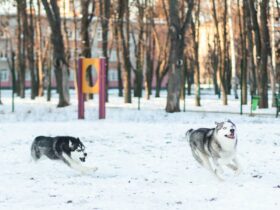Huskies, known for their striking appearance and resilient nature, are a breed that captivates the hearts of many. However, Husky owners often encounter a common concern: their beloved pet’s persistent itchiness. This issue not only causes discomfort to the dog but also raises concerns for the owners. Huskies’ thick double coats and sensitive skin make them susceptible to various skin conditions. The purpose of this article is to delve into the various reasons behind a Husky’s itchiness. From allergies to parasites, and dietary influences to environmental factors, we will explore the common causes and provide practical solutions to alleviate your Husky’s discomfort. This comprehensive guide aims to equip Husky owners with the knowledge and tools needed to ensure the health and happiness of their furry companions.
Why Is My Husky So Itchy?
Huskies often experience itchiness due to several reasons, including allergies (food, environmental, or contact), parasites (like fleas, ticks, or mites), skin infections, or dry skin. Their thick coat can also trap dirt and allergens, exacerbating skin issues. Identifying the specific cause is crucial, as it can range from easily manageable conditions to more serious health concerns requiring veterinary attention.
Common Causes Of Itchiness In Huskies
The common causes of itchiness in Huskies can be categorized as follows:
Allergies:
- Food Allergies: Some Huskies may develop allergies to certain ingredients in their diet, such as grains, beef, chicken, or dairy.
- Environmental Allergies: Allergens like pollen, mold, and dust mites can cause allergic reactions.
- Contact Allergies: Sensitivity to specific substances like certain fabrics, shampoos, or lawn chemicals.
Parasites:
- Fleas: One of the most common causes of itchiness. Flea bites can cause severe irritation and allergic reactions.
- Ticks And Mites: Can also cause itching and skin irritation. Mites can lead to conditions like mange.
Skin Infections:
- Bacterial Infections: Often secondary to damage caused by scratching, biting, and licking.
- Fungal Infections: Such as yeast infections, which can cause itchy skin.
Dry Skin:
- Climate: Dry, cold weather can sap moisture from a Husky’s skin.
- Over-Bathing: Frequent baths can strip natural oils from their skin, leading to dryness and irritation.
Underlying Health Issues:
- Hormonal Imbalances: Conditions like hypothyroidism can cause skin issues.
- Autoimmune Diseases: Some autoimmune disorders can manifest as skin problems.
Psychological Factors:
- Stress Or Anxiety: Can lead to compulsive scratching or licking.
- Improper Grooming: Not brushing a Husky’s thick coat regularly can lead to matting and skin irritation.
- Shampoo Residue: Not thoroughly rinsing off shampoo can cause itchiness.
Treatment And Management
Treating and managing itchiness in Huskies involves a combination of medical interventions, home care, and lifestyle adjustments. Here’s a detailed approach:
Medical Treatments:
- Veterinary Prescriptions: Depending on the cause, a vet may prescribe antihistamines, corticosteroids, or other anti-inflammatory drugs to reduce itching.
- Topical Treatments: Medicated shampoos, creams, or sprays specifically designed to soothe itchy skin.
- Antibiotics Or Antifungals: For treating bacterial or fungal infections.
- Parasite Control: Regular flea and tick prevention treatments.
Natural Remedies And Supplements:
- Omega-3 Fatty Acids: Supplements like fish oil can improve skin health and reduce inflammation.
- Aloe Vera And Oatmeal Baths: Natural soothing agents for irritated skin.
- CBD Oil: Some pet owners find CBD oil helpful for reducing inflammation and anxiety-related scratching.
Grooming And Skin Care:
- Regular Brushing: Helps remove dead hair and skin, reducing irritation.
- Appropriate Bathing: Using hypoallergenic, moisturizing dog shampoos and not over-bathing.
- Moisturizers: Specialized dog skin moisturizers can help maintain skin hydration.
Dietary Management:
- Hypoallergenic Diet: If food allergies are suspected, a trial with a hypoallergenic diet might be recommended.
- Balanced Diet: Ensure the diet is rich in essential nutrients for skin health.
Environmental Modifications:
- Allergen Control: Regular cleaning to reduce dust mites, pollen, and other environmental allergens.
- Humidifiers: Adding moisture to the air can help prevent dry skin, especially in colder climates.
Tips For Creating A Skin-Friendly Living Space
Creating a skin-friendly living space for your Husky is crucial in managing and preventing itchiness. Here are some tips to achieve this:
- Maintain A Clean Environment: Regularly vacuum and dust your home to minimize the presence of allergens like dust mites, pollen, and pet dander. Wash your Husky’s bedding, blankets, and any soft furnishings they frequently use in hypoallergenic detergent.
- Air Quality Control: Use air purifiers with HEPA filters to capture airborne allergens and irritants. Consider using a humidifier, especially in dry climates or during winter, to add moisture to the air and prevent dry skin.
- Allergen-Free Bedding: Opt for hypoallergenic bedding for your Husky. Avoid wool and other materials that might irritate your dog’s skin.
- Safe Cleaning Products: Use pet-safe, non-toxic cleaning products. Many common household cleaners contain chemicals that can be harmful or irritating to your Husky’s skin.
- Controlled Outdoor Environment: After walks, gently wipe down your Husky’s coat and paws to remove any allergens or irritants they might have picked up outside. Keep your yard free from plants known to cause allergies in dogs.
- Optimize Bathing Routine: Use a gentle, dog-specific shampoo recommended by your vet. Ensure thorough rinsing to remove all soap residues, which can cause irritation.
- Minimize Stress: Provide a quiet, comfortable space for your Husky to retreat to. Stress can exacerbate skin conditions. Consistent routines and calm environments can help reduce anxiety.
- Diet Consideration: Store your Husky’s food in airtight containers to keep it fresh and free from contaminants. Consider using stainless steel food and water bowls, as plastic bowls can sometimes harbor bacteria or cause allergies.
By implementing these measures, you can significantly reduce the risk of skin irritations and create a more comfortable living environment for your Husky. Remember, a healthy environment contributes to overall well-being and can help keep skin problems at bay.
Prevention Strategies
Preventing itchiness in Huskies involves several strategies focused on their health, grooming, and environment. Here are key prevention measures:
- Regular Veterinary Check-Ups: Schedule routine veterinary visits for health assessments and early detection of skin issues. Discuss preventative care, including vaccinations and parasite control.
- Parasite Prevention: Use vet-recommended flea and tick preventatives year-round.
- Proper Nutrition: Feed a balanced diet rich in essential nutrients, particularly those beneficial for skin health, like omega-3 fatty acids. Consider hypoallergenic diets if your Husky has a history of food allergies.
- Regular Grooming: Brush your Husky’s coat regularly to remove dead hair and skin, and to distribute natural oils. Bathe your Husky with a mild, dog-specific shampoo as needed, avoiding over-bathing which can dry out their skin.
- Environmental Management: Keep your home clean and free of dust, dander, and other potential allergens. Use air purifiers and maintain a moderate humidity level to reduce airborne allergens and skin dryness.
- Avoid Known Allergens: If specific allergens have been identified, take steps to minimize your Husky’s exposure to them.
- Skin And Coat Supplements: Supplements like fish oil can promote healthy skin and coat. Consult your vet before adding any supplements to your Husky’s diet.
- Stress Management: Provide a calm, stable environment as stress can exacerbate skin conditions. Engage in regular exercise and mental stimulation to keep your Husky happy and healthy.
- Educate Yourself: Stay informed about common health issues in Huskies, signs of skin problems, and ways to address them.
- Hydration: Ensure your Husky has constant access to fresh water to help maintain healthy skin and coat.
By implementing these preventive measures, you can significantly reduce the chances of your Husky developing itchy skin and ensure their overall well-being. Remember, consistent care and attention are key in keeping your furry friend happy and healthy.
Conclusion
In conclusion, understanding and addressing itchiness in Huskies is essential for their well-being. This article has explored the common causes, symptoms, and effective treatments for this prevalent issue. By following a comprehensive approach that includes veterinary care, grooming, nutrition, and environmental management, you can provide your Husky with relief from itchiness and maintain their skin health. Remember, a healthy and happy Husky begins with proactive prevention and attentive care, ensuring a vibrant and comfortable life for your furry companion.
FAQ’s
What Are Common Signs Of Itchiness In Huskies?
Common signs include excessive scratching, biting, licking, hair loss, redness, and the presence of hot spots.
Can Allergies Cause Itchiness In Huskies?
Yes, allergies to food, environmental allergens (like pollen), and contact allergens (like certain shampoos) can lead to itchiness in Huskies.
How Often Should I Bathe My Husky To Prevent Itchiness?
Typically, Huskies should be bathed every 2 to 4 months. Over-bathing can strip natural oils and lead to dry skin.
What Should I Do If My Husky Has Fleas Or Ticks Causing Itchiness?
Consult your vet for safe and effective flea and tick treatments. Ensure your home environment is also treated.
Are There Specific Dietary Recommendations To Prevent Skin Issues In Huskies?
While there’s no one-size-fits-all diet, a balanced, high-quality diet with essential nutrients can promote skin health. Consult your vet for personalized dietary advice.







Leave a Reply